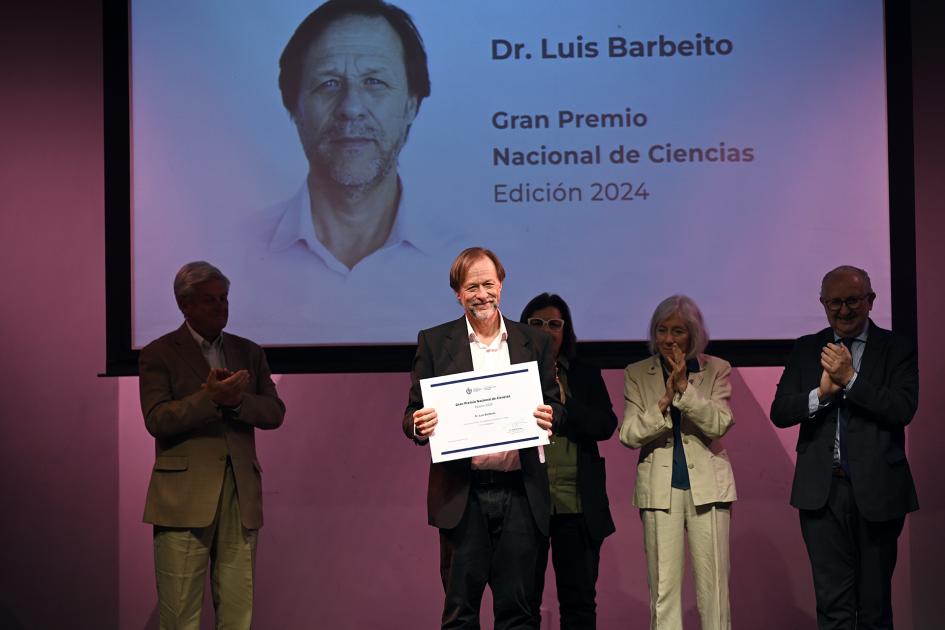Luis Barbeito, a scientist with a long career in neurosciences, founder and former director of the Institut Pasteur de Montevideo, is the winner of the Gran Premio Nacional de Ciencias 2024, awarded by the Ministry of Education and Culture every three years since 2021.
The award highlights the scientific work of Uruguayan researchers and, based on nominations from colleagues, evaluates the production of knowledge, the training of human resources and the contribution to institution building.
The jury, composed of the Minister of Education and Culture, a member of the National Council for Innovation, Science and Technology and representatives of the academies of Science, Engineering, Medicine and Veterinary Medicine, highlighted several of Barbeito’s achievements in different areas.
According to the award certificate, Barbeito has had an outstanding career as a leader of neuroscience research groups focused on the chemistry of excitatory amino acid-mediated neurotransmission and on the role of glial cells in the progression of neurodegenerative diseases, particularly amyotrophic lateral sclerosis. He also points out that Barbeito has introduced new research models in neuroscience to deepen the knowledge of the cellular mechanisms that lead to progressive neuronal death and, at the same time, to devise new therapeutic interventions aimed at halting the progression of the neurodegenerative process. In this regard, according to the minutes, the patents generated on new therapeutic agents to combat these ailments are irrefutable evidence.
A focus of his work has been the understanding of astrocyte transformation processes from cells that at the physiological level provide trophic support to neurons to mediators of neurotoxicity and neuronal death in pathologies of the nervous system. In addition, he and his colleagues have investigated the interaction of neural cells with immune cells such as mast cells, neutrophils and myeloid precursors, as well as the role of cellular senescence.
The jury also valued the awards received by Barbeito throughout his career, from the Claude Bernard Award of the Franco-Uruguayan Medical Association in 1984, his appointment as a full member of the Academies of Sciences and Medicine, and the Doctor Honoris Causa of the Faculty of Medicine, University of the Republic, awarded in 2024.
He also highlighted his scientific production, which includes more than one hundred peer-reviewed publications in renowned journals, as well as book chapters in his field of research.
Along with this work, Barbeito has also dedicated himself to the training of human resources in neurobiology, not only through his teaching activity at the School of Medicine, but also through the 19 Master’s theses and 12 PhD theses completed under his guidance.
In addition to these contributions, the jury highlighted Barbeito’s fundamental work in national academic institutions. For example, in his extensive career he has been president of the Board of Directors of the Instituto de Investigaciones Biológicas Clemente Estable (1996-1999 and 2003-2005), president of the Consejo Nacional de Investigaciones Científicas y Técnicas (CONICyT) (2005-2008) and executive director of the Institut Pasteur in Montevideo.
Biographical summary
Barbeito, who graduated from the School of Medicine of the Udelar in 1982, began his interest in neurobiology research as an assistant in the Department of Histology and Embryology (1978-1981). He then joined the Instituto de Investigaciones Biológicas Clemente Estable (IIBCE), where he continued his research and became head of the Department of Cellular and Molecular Neurobiology until 2010. Between 1985 and 1989, he completed a specialization in Neuropharmacology at the Collège de France (Paris), which laid the foundations for his future lines of research in the area of Neurochemistry. In 2005 he joined the Pasteur Institute in Montevideo as scientific director and head of the Neurodegeneration Laboratory. From 2008 to 2018 he served as executive director of the institution.
In 2024 he finished his work at the head of the laboratory, but he continues to be linked through Xeptiva, a start-up incubated at the institute that, based on the results of the pain-related research carried out at IP Montevideo, has focused on developing products for use in pets to treat diseases whose common denominator is chronic inflammation.


